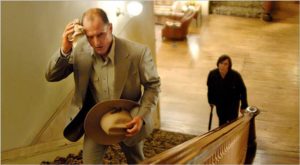Olive Kitteridge is back
 American author Elizabeth Strout is one of my favourite writers, and the imminent return of her most compelling character is a delightful prospect for any reader who enjoys smart, nuanced storytelling.
American author Elizabeth Strout is one of my favourite writers, and the imminent return of her most compelling character is a delightful prospect for any reader who enjoys smart, nuanced storytelling.
Olive, Again is being released next month, a follow-up to Strout’s Pulitzer Prize-winning 2008 novel Olive Kitteridge, and I can’t wait to get my copy.
The PR blurb reads: ‘Olive, Again follows the blunt, contradictory yet deeply loveable Olive Kitteridge as she grows older, navigating the second half of her life as she comes to terms with the changes – sometimes welcome, sometimes not – in her own existence and in those around her.
‘Olive adjusts to her new life with her second husband, challenges her estranged son and his family to accept him, experiences loss and loneliness, witnesses the triumphs and heartbreaks of her friends and neighbours in the small coastal town of Crosby, Maine – and, finally, opens herself to new lessons about life.’
Rarely do characters come as multi-layered as Olive. Strout used all her creative expertise and deep understanding of human relationships to craft a powerful and quirky persona. Olive, an ill-tempered junior high school maths teacher who gives her husband short shrift at pretty much every opportunity, is brusque, flawed and fascinating in roughly equal measure.
Intellectually sharp yet lacking emotional intelligence, she is conflicted by, among many other things, feelings of guilt over an affair she has with a colleague at the school and severe frustration at her inability to show love and openness, particularly when in the company of her son.
Not one for social niceties, Olive’s bluntness and absence of self-awareness leads her down several rough and difficult paths. The character reached iconic status when portrayed by the mesmeric Frances McDormand in HBO’s 2014 TV series based on the book, the actress nailing the emotional complexity of Olive’s nature with exquisite compassion and discord.
It’s hard to believe that Olive Kitteridge was only Strout’s third published novel, considering the masterful poise and elegance of the writing style. The richness and authenticity of the title character is woven into a collection interrelated stories within the book, allowing the multiple perspectives to add wider context (a technique Strout echoes in the sublime Anything is Possible, released in 2017).
Olive, Again looks set to reaffirm Strout’s status as an extraordinarily gifted novelist whose place as one of the very best storytellers is already assured. Her vision and fully-rounded grasp of human behaviour – and her ability to translate that to the page – has given us an array of convincing characters – and they don’t come any more convincing than Olive Kitteridge.
“It turns out – I just wasn’t done with Olive,” Strout says. “It was like she kept poking me in the ribs, so I finally said, ‘Okay, okay’…”
6 scintillating scenes set in hotels
 When hotels crop up in fiction, the story tends to crank up a notch. They serve as a base for characters in transition, often marking a major turning point in a protagonist’s trajectory.
When hotels crop up in fiction, the story tends to crank up a notch. They serve as a base for characters in transition, often marking a major turning point in a protagonist’s trajectory.
With the comfort of home or familiarity of work out of the equation as a setting, hotels are natural havens for dark reflection, for brewing trouble.
They are places to set up an illicit rendezvous, to seek shelter in an emergency, to lay low and heal wounds, to hatch a plan, to break up a defining journey, to let loose on holiday, to discover a secret.
And they generate change. Characters rarely check out in the same state or mood as when they arrived…
No Country for Old Men
Let’s kick off with this Cormac McCarthy cracker that treats us to hotel scenes aplenty. There’s Llewelyn Moss holing up with a satchel containing $2.4m in stolen cash that hired hitman Anton Chigurh nearly snatches from his grasp in a Texas motel, not to mention Chigurh patching himself up from bullet wounds later on as the brutal chase spills south. But my abiding memory of this book is a recovering Chigurh taking out rival hitman Carson Wells, who is also on the trail of the loot, in Wells’ hotel room near the Mexican border. The two share some candid words in the darkened room as a poised Chigurh holds his shotgun at Wells, McCarthy’s pitch-perfect dialogue making it feel like a privilege to eavesdrop on this private discourse between two pro killers as death looms.
Just do it.
Yes, they always say that. But they don’t mean it, do they?
The Eye of the Beholder
A rogue PI follows Joanna Eris, a scheming serial killer, in this creepy cross-state thriller from Marc Behm. Fascinated by her actions, the PI, unbeknown to Joanna, cleans up after her murders as she vaults from city to city seducing rich men and killing them. During a stay in New York, an off-duty NYPD sergeant sees her fleeing the scene of a minor road accident and follows her back to her hotel room. Inside, he asks her questions and is met by a wall of evasiveness as the tension rises. Sensing she has something to hide, the cocky officer threatens to arrest her. For the first time we sense Joanna’s world falling apart, but she gathers herself and identifies the sleazy officer’s weakness. As he moves closer suggesting a sexual bribe, she swipes his pistol from his holster and shoots him dead. The snooping PI, having bugged the room, hears everything and is relieved that his voyeuristic adventures can continue.
The Shining
Stephen King in his pomp, creating one of the most haunting settings ever with the isolated Overlook Hotel in the Colorado Rockies. Winter caretaker Jack Torrance is starting to suffer from cabin fever in the vast and vacant hotel, his erratic state putting his wife and son in danger. Out of all the chilling scenes, the most telling in which our view of Jack changes forever is when he walks into the huge ballroom where the bar, as we well know by now, has no alcohol. But in a flash the shelves are lined with bottles of liquor and a bartender, Lloyd, is serving Jack drinks. Jack talks about his woes, Lloyd is a good listener. The presence of another character brings a new dynamic to the story, the fresh voice penetrating the mind of the reader. King makes it clear that Lloyd is a ghost and the drinks are imaginary, leaving us in fear of Jack’s sanity as Lloyd, speaking on behalf of the hotel’s malicious spirit it seems, advises Jack to ‘correct’ his family. There’s no turning back now.
The Motel Life
This 2006 debut novel from Willy Vlautin is a taut and compassionate tale of two destitute high-school-dropout brothers, Frank and Jerry Lee, set in Nevada. Forced to go on the run after Jerry Lee, drink driving one night, accidentally hits and kills a teenage cyclist, they head for Montana, sleeping in their car on some nights and in cheap motels on others. Vlautin skilfully explores the fears, frustrations and faded dreams of two low-income young men left behind by society and desperately short of luck. Riddled with guilt from the fatal accident, Jerry Lee shoots himself in the leg. While in hospital recuperating, he persuades Frank to break him out so they can continue their journey. In a motel in Elko, the brothers spend the night talking about their lives and fight to raise each other’s spirits in a heartrending scene, as Jerry Lee’s wounds worsen.
The Day of the Jackal
The Jackal, on a hired mission to assassinate Charles de Gaulle in 1960s Paris, has the French police on his tail and is starting to feel the pressure in this Frederick Forsyth classic. During a brief stay in a swish hotel in the south of France we see a different side to him as he seduces an older French woman. Although his survival instincts are part of the exercise (he later takes refuge in the woman’s chateau before he is forced to kill her when she discovers his rifle amongst his belongings), the scene stands out as it shows the Jackal acting on a motivation other than his ultra-professional drive to complete his mission. After the killing, the Jackal is no longer seen by the reader as unflappable.
Psycho
Couldn’t really miss this one out now, could I? Robert Bloch’s 1959 hit is one of the most absorbing mysteries ever written and served as a blueprint for how to weave deep psychological analysis into the flow of a thriller. My favourite scene in the Bates Motel is when Norman spies on Mary through the drilled hole in his office wall that runs into her bathroom after they’ve just shared an awkward dinner at the house following her late arrival with no open restaurant nearby. Drunk, confused, angry and excited, Norman gets dizzy at the sight of Mary undressing (she was swaying back and forth . . . and she was wavy, and he couldn’t stand it, he wanted to pound on the wall, he wanted to scream at her to stop) and, we’re led to believe at this stage, passes out in the office chair just before Mary enters the shower.
And another 6 that almost made it…
The Spy Who Loved Me, by Ian Fleming.
Pessimist, by Chris Rhatigan
Galveston, by Nic Pizzolatto
Jack’s Return Home, by Ted Lewis
1980, by David Peace
Those Who Walk Away, by Patricia Highsmith
Why Dodgers is the book of the decade so far
 Some books impress you for their slick writing style or their gripping story. Or their well-drawn characters or the captivating world they carve into your imagination. Dodgers doesn’t impress you. It chisels itself into you. It overpowers you. It stays with you.
Some books impress you for their slick writing style or their gripping story. Or their well-drawn characters or the captivating world they carve into your imagination. Dodgers doesn’t impress you. It chisels itself into you. It overpowers you. It stays with you.
Bill Beverly’s debut novel, published in 2016, came out of nowhere. The author, Associate Professor of English at Trinity University in Washington DC, doesn’t appear to be your average breakthrough novelist. At the time of writing he has yet to release another work of fiction, so cashing in while his name is hot isn’t on his agenda. According to interviews, he took his time penning Dodgers. It was worth the wait.
Giving himself no deadline as he wrote, he went against what many new writers are encouraged to do by agents in the modern publishing climate: plan everything with a long-running series in mind. Culminating far too often in a stale, recurring main character doing the same things again and again. No, Dodgers is purely a standalone tale – as all the great works of literature are.
Relayed in meticulous and economical third-person prose, we follow the journey of 15-year-old LA ghetto soldier East in what can be described as both a crime caper road trip and a coming-of-age saga, a contemporary thriller in dialogue and place with the stylistic undertones of a classic fable.
East, the eldest son of a troubled single mother, works for a drug peddling crew, just like pretty much everyone else he knows on the streets of the bleak African-American suburban landscape he has been raised, where the prospect of a violent death is constant. Resourceful, watchful and earnest, he has a natural flair for survival – and he’s going to need it.
The crew’s boss, Fin, needs a Wisconsin-based witness killed before the guy can testify against his nephew in an upcoming trial. Fin tasks East, his trigger-happy 13-year-old half-brother Ty, and two other young crew members – the overweight Walter and the cocky Michael – with travelling across America to carry out the hit.
Hopping on a flight is deemed by Fin as too traceable, so he sets them up with a van kitted out with sleeping quarters and money for petrol and basic leaving expenses. The gang of four are forced to ditch their IDs, cards, phones and weapons so they can’t be identified if caught. They are all given LA Dodgers baseball jerseys to wear as cover, hence the title.
East has never been outside his home city before, and the country and terrain is alien to all of them. It’s not long before the quartet are at odds with each other as well as the job, and it turns out that Ty is carrying, having hidden a small pistol in his trousers. It’s okay, he’s only the most unstable of the four in that van.
Things don’t go to plan. The four of them have to improvise under pressure as things fall apart amidst a backdrop of the Midwest heartland rusting to a slow death. Characters are tested as the drama heightens. The van is vandalised and spray-painted with a racial slur. The mission flips. East and Michael have a vicious punch-up, the group splits in stages.
East, wise but with plenty still to learn, naïve yet world-weary, carries so much weight and humanity. He is one of the most original and heartrendingly authentic characters I’ve ever read.
The book is sharp and taught, while everything that happens is driven by a convincing rationale. These characters don’t have many choices to make, if any at all. The plot is simple and tense; there is no need for coincidences or twists. The observations Beverly draws are insightful and relevant, the visuals he paints in your mind are startlingly real.
Dodgers has drawn merited comparisons to HBO gem The Wire and picked up Golden Dagger Awards for both best crime novel and best debut. For me, nothing has matched it for many years. We had some great releases in the noughties and Dodgers is, so far, the best book of the 2010s (is that what they’re calling this decade?).
Check it out. If you already have, read it again.
[Top]